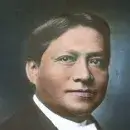
Wassaja (Signaling), Carlos Montezuma
Wassaja (Signaling), Carlos Montezuma, was a Yavapai-Apache Native American activist, physician, and founding member of the Society of American Indians. Wassaja was the first Native American student at the University of Illinois and Chicago Medical College (now Northwestern University Feinberg School of Medicine), and the first Native American man to earn a medical degree. Born in the Arizona Territory, he was kidnapped at the age of five by Pima raiders and sold to an itinerant Italian photographer, Carlo Gentile. As a child, Wassaja accompanied Gentile in his photographic and ethnographic expeditions in Arizona, New Mexico, and Colorado. In 1872–1873, they joined the Wild West theatrical troupe of Ned Buntline and Buffalo Bill, where Wassaja was featured as Azteka, the Apache-child of Cochise.
Wassaja worked as a physician for the Indian Bureau, and served at three different Indigenous schools and reservations. He decried the squalid conditions of the schools and lack of medical supplies and became an outspoken opponent of the Bureau of Indian Affairs. From 1896 until 1922, he had a private medical practice in Chicago, and also taught at medical schools in the city.
In 1906, Wassaja turned down an offer from President Theodore Roosevelt to become Commissioner of Indian Affairs. President Woodrow Wilson asked him to serve as the head of the Bureau of Indian Affairs; he declined. Instead, he helped found the Society of American Indians in 1911, the first Indian rights organization created by and for Indians. In 1916, he started a monthly magazine titled Wassaja that he used to share his views of the Bureau of Indian Affairs, Native American education, civil rights, and citizenship. He was ultimately successful in ensuring the Yavapai had their own reservation on a portion of their ancestral lands, with the establishment of the Fort McDowell Yavapai Nation in 1903.